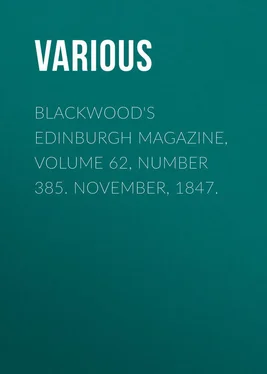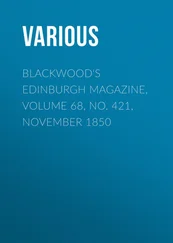Various - Blackwood's Edinburgh Magazine, Volume 62, Number 385. November, 1847.
Здесь есть возможность читать онлайн «Various - Blackwood's Edinburgh Magazine, Volume 62, Number 385. November, 1847.» — ознакомительный отрывок электронной книги совершенно бесплатно, а после прочтения отрывка купить полную версию. В некоторых случаях можно слушать аудио, скачать через торрент в формате fb2 и присутствует краткое содержание. Издательство: Иностранный паблик, Жанр: periodic, foreign_edu, Путешествия и география, на английском языке. Описание произведения, (предисловие) а так же отзывы посетителей доступны на портале библиотеки ЛибКат.
- Название:Blackwood's Edinburgh Magazine, Volume 62, Number 385. November, 1847.
- Автор:
- Издательство:Иностранный паблик
- Жанр:
- Год:неизвестен
- ISBN:нет данных
- Рейтинг книги:4 / 5. Голосов: 1
-
Избранное:Добавить в избранное
- Отзывы:
-
Ваша оценка:
- 80
- 1
- 2
- 3
- 4
- 5
Blackwood's Edinburgh Magazine, Volume 62, Number 385. November, 1847.: краткое содержание, описание и аннотация
Предлагаем к чтению аннотацию, описание, краткое содержание или предисловие (зависит от того, что написал сам автор книги «Blackwood's Edinburgh Magazine, Volume 62, Number 385. November, 1847.»). Если вы не нашли необходимую информацию о книге — напишите в комментариях, мы постараемся отыскать её.
Blackwood's Edinburgh Magazine, Volume 62, Number 385. November, 1847. — читать онлайн ознакомительный отрывок
Ниже представлен текст книги, разбитый по страницам. Система сохранения места последней прочитанной страницы, позволяет с удобством читать онлайн бесплатно книгу «Blackwood's Edinburgh Magazine, Volume 62, Number 385. November, 1847.», без необходимости каждый раз заново искать на чём Вы остановились. Поставьте закладку, и сможете в любой момент перейти на страницу, на которой закончили чтение.
Интервал:
Закладка:
But it is admitted that the navigation of the Torres Strait and the Coral Sea, however exactly surveyed, must always be hazardous. Hazy weather, errors of reckoning, errors in the chronometer, &c., must always produce a considerable average of casualties in the Strait. Yet, from the nature of the reef, when these casualties do occur, the vessel will generally be fixed on the rocks long enough for the crew to escape in their boats. There, however, a new hazard begins. The only places of refuge for these boats at present are Port Essington, six hundred miles beyond Cape York; or Coupang, in Timor, five or six hundred miles further to the westward.
Mr Jukes strongly recommends the formation of a post at Cape York, as not merely enabling the shipwrecked crews to arrive at an immediate place of safety, but as affording assistance to the vessel, and securing her cargo. From Cape York there would be easy opportunities of a passage to Singapore. In case of war, the advantages of having a military station at this point would be of the highest value; as, otherwise, an enemy's corvette might command the Strait. It would also make a valuable depôt for stores necessary for the relief of vessels. In case of the further extension of steam navigation between India and New South Wales, of which there can now be no doubt, Cape York would make an excellent coal depôt. In short, unless the narrator's imagination runs away with him, it would answer any necessary purpose of navigation, and ought to attract the consideration of government without loss of time.
Allowing for all the ardour of fancy, there can be no question that the period is coming rapidly when the mind of Europe will be strongly directed to the natural wealth of the vast chain of islands reaching from New Caledonia to New Guinea. China, the Moluccas, and the great islands of the South, will hereafter supply a commerce unequalled in the East, or perhaps in the world. Of this Torres Strait must inevitably be the channel; a new city will be necessary to concentrate that commerce, and Cape York offers the foundation for a new Singapore.
If a philosopher were to inquire, in what portion of the globe man might enjoy the largest portion of physical happiness; or if a politician were to search for a new seat of empire, combining the capacity of sustaining the largest population and the most direct action on the great adjoining continent; or if the merchant were to examine the Asiatic hemisphere, with a mere view to the richness and variety of products – each would probably decide for the Indian Archipelago; that immense region of immense islands lying between Sumatra and New Guinea, east and west, and the Philippines and Timor, north and south.
They are at least a wholly new region; for though peopled for hundreds, or perhaps thousands of years, and visited in the old times of European commerce with more frequency than even in our active day, their actual condition remains nearly unknown: their fertility is comparatively neglected; their spontaneous products are left to waste; their singular beauty is disregarded, and their mineral wealth is unwrought. Their people are content with savage existence, and the bounty of Heaven is thrown away in the loveliest portion of the globe. Piracy at sea, war on land, tyranny, vice, and ignorance, are the habits and characteristics of a zone which could sustain a population as numerous as that of Europe, and supply the wants and even the luxuries of half the world. Celebes, New Guinea, Timor, Java, Borneo, that most magnificent of all islands, if it should not rather be called a continent: the vast group of the Philippines, only await the industry and intelligence of Europe. They will yet be brilliant kingdoms and mighty empires.
Why such noble realms should have been long given over to barbarism is among the most curious questions of the philosopher, and of the Christian. May they not have been kept back from European possession and utility on the providential principle, which we discover so often in the general order of the divine government; namely, to be reserved as a reward and a stimulant to the growing progress of mankind? They may have been suffered to remain in a state of savage life as a penalty for the profligacy of their people, or they may have been condemned to their mysterious obscurity until the impress of British power on India and China should have been deeply made, and England should be led, by the possession of India and the opening of the Chinese coasts, to follow the new course of wealth prepared for her in the commerce of the Indian Ocean.
Whatever may be the truth of those suggestions, nothing can be more evident, than that British discovery and British interests are now involuntarily taking that direction. The settlement on Borneo by the enterprise and intelligence of Mr Brookes has given our commerce, a sudden and most unexpected footing in this queen of the Indian Ocean. The English colonisation of Australia will inevitably sustain that intercourse. The flourishing settlement of Singapore, and the growing population of the west coast of America, from Oregon down to California, all converge toward the same result, the increased commerce and civilisation of the Indian islands.
It is also to be remembered, that those are all events of the last ten years. But when Mexico shall have given up the Californias, which there seems every probability of her being compelled to do, or to see them overrun by the active emigration from the United States, the impulse will be still more rapid, powerful, and extensive. We look upon the whole series of these coasts as all indication of some striking advance prepared for the general family of man.
In October 1844 the Fly left Port Essington, on her way to Java to refit. On the way they passed a succession of islands, known by scarcely more than name to the English navigator. They all seem to be volcanic, though their volcanoes may sleep; and rapid as the glance of the voyagers was, they all, even in the wildness of precipitous shores and mountain peaks, exhibited beauty.
They steered up the channel which passes between the shores of Java and Madura, an island which seems to have been cut out of Java. The Madura shore showed a continuous belt of the richest tropical vegetation. The Java shore, though flat and swampy in this part, showed a back ground of mountains, some of them from ten thousand to twelve thousand feet high. They were now in Dutch territory; and, passing by some Dutch steamers and vessels of war, cast anchor near the town of Sourabaya. Here the captain and some of the officers landed, found a large new fort or citadel in the act of fortifying; walked through the town, which contained many good European houses, mingled with hovels of the natives and Chinese; dined at a good table-d'hôte , got into a calèche , and drove round the town, which seemed very extensive, and its suburbs still more so. Here, except for the visages of the natives and the lamps of the Chinese, they might have imagined themselves in Europe again. They drove up one road and down another for several miles, under avenues of trees, interrupted here and there by the country-houses of Europeans. Many of those seemed spacious; and all were thrown open, and lighted with many lamps. In front of the houses were parties of ladies and gentlemen, sitting in verandas and porticoes, taking tea or wine, smoking or playing cards, and chatting. They met one or two carriages of ladies in full dress, driving about without bonnets to enjoy the cool of the evening.
Then came a scene of another kind. They re-entered the town by the Chinese quarter. There they found grotesque-looking houses, lit up with large paper lanterns of gaudy colours, with Chinese inscriptions or monsters on them, and long rows of Chinese characters up and down the door-posts or over the windows. Crowds of people swarmed along the streets, and strange cries, in a Babel of languages, resounded in their ears, and every variety of Eastern figure flitted about them, from the half-naked Couli to the well-clothed Chinese in a loose white jacket like a dressing-gown, the Arab merchant in his flowing robes, and the Javanese gentleman in smart jacket and trousers, sash petticoat, curious pent-house-like hat, and strange-handled creese or dagger stuck in his girdle. The view of the country in the morning was, however, much less captivating; it was flat and marshy, and intersected by large ditches. The roads are on dykes four or five feet above the level of the fields, and lined with rosewood trees, an Eastern Holland.
Читать дальшеИнтервал:
Закладка:
Похожие книги на «Blackwood's Edinburgh Magazine, Volume 62, Number 385. November, 1847.»
Представляем Вашему вниманию похожие книги на «Blackwood's Edinburgh Magazine, Volume 62, Number 385. November, 1847.» списком для выбора. Мы отобрали схожую по названию и смыслу литературу в надежде предоставить читателям больше вариантов отыскать новые, интересные, ещё непрочитанные произведения.
Обсуждение, отзывы о книге «Blackwood's Edinburgh Magazine, Volume 62, Number 385. November, 1847.» и просто собственные мнения читателей. Оставьте ваши комментарии, напишите, что Вы думаете о произведении, его смысле или главных героях. Укажите что конкретно понравилось, а что нет, и почему Вы так считаете.












